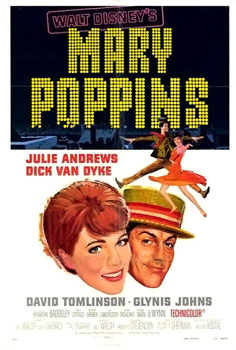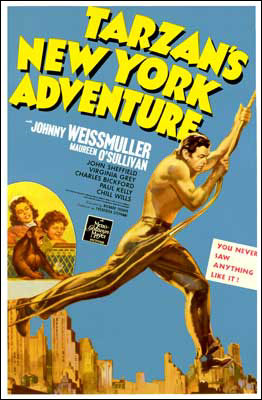Related Research Articles

The Broadway Melody, also known as The Broadway Melody of 1929, is a 1929 American pre-Code musical film and the first sound film to win an Academy Award for Best Picture. It was one of the early musicals to feature a Technicolor sequence, which sparked the trend of color being used in a flurry of musicals that would hit the screens in 1929–1930.

Mary Poppins is a 1964 American musical fantasy comedy film directed by Robert Stevenson and produced by Walt Disney, with songs written and composed by the Sherman Brothers. The screenplay is by Bill Walsh and Don DaGradi, based on P. L. Travers's book series Mary Poppins. The film, which combines live-action and animation, stars Julie Andrews in her feature film debut as Mary Poppins, who visits a dysfunctional family in London and employs her unique brand of lifestyle to improve the family's dynamic. Dick Van Dyke, David Tomlinson, and Glynis Johns are featured in supporting roles. The film was shot entirely at the Walt Disney Studios in Burbank, California, using painted London background scenes.
Carter Bassett Harrison was a politician from the U.S. state of Virginia.

Colonel Robert Bolling was an English-born merchant, planter, politician and military officer.

William Randolph I was an English-born planter, merchant and politician in colonial Virginia who played an important role in the development of the colony. Born in Moreton Morrell, Warwickshire, Randolph moved to the colony of Virginia sometime between 1669 and 1673, and married Mary Isham a few years later. His descendants include many prominent individuals including Thomas Jefferson, John Marshall, Paschal Beverly Randolph, Robert E. Lee, Peyton Randolph, Edmund Randolph, John Randolph of Roanoke, George W. Randolph, and Edmund Ruffin. Due to his and Mary's many progeny and marital alliances, they have been referred to as "the Adam and Eve of Virginia".

Tarzan's New York Adventure is a 1942 American adventure film from Metro Goldwyn Mayer, produced by Frederick Stephani, directed by Richard Thorpe, that stars Johnny Weissmuller and Maureen O'Sullivan. This was the sixth and final film in MGM's Tarzan series and was the studio's last Tarzan feature until 1957's Tarzan and the Lost Safari. Although Tarzan's New York Adventure includes scenes set in New York, as well as the customary jungle sequences, it is yet another Tarzan production primarily shot on MGM's back lots.

A Watcher in the Woods is a 1976 mystery novel by Florence Engel Randall that was published by Atheneum Books.

Major John Bolling was an American planter, politician and military officer in the colony of Virginia. He was the great-grandson of Pocahontas and her husband, John Rolfe.

The Godless Girl is a 1928 American sound part-talkie drama directed by Cecil B. DeMille. In addition to sequences with audible dialogue or talking sequences, the film features a synchronized musical score and sound effects along with English intertitles. The soundtrack was recorded using the RCA Photophone sound-on-film system. The cast features Lina Basquette, Marie Prevost, Tom Keene, and Noah Beery.

3 Needles is a 2005 Canadian drama film directed by Thom Fitzgerald. The title refers to the three main characters who make a deal with the Devil in order to survive a global epidemic. The plot deals with interwoven stories of persons around the world who are dealing with HIV and AIDS, and stars Shawn Ashmore, Olympia Dukakis, Lucy Liu, Stockard Channing, Chloë Sevigny, and Sandra Oh.

Edward Quillan was an American film actor and singer whose career began as a child on the vaudeville stages and silent film and continued through the age of television in the 1980s.
Armistead Burwell of Dinwiddie County, Virginia was a planter and a colonel of the United States Army in the War of 1812.

Hollywood Party, also known under its working title of The Hollywood Revue of 1933 and Star Spangled Banquet, is a 1934 American pre-Code musical film starring Laurel and Hardy, The Three Stooges, Jimmy Durante, Lupe Vélez and Mickey Mouse. It was distributed by Metro-Goldwyn-Mayer. Each sequence featured a different star with a separate scriptwriter and director assigned.

Elizabeth Hobbs Keckley was an African-American seamstress, activist, and writer who lived in Washington, D.C. She was the personal dressmaker and confidante of Mary Todd Lincoln. She wrote an autobiography.
Grand Slam Opera is a 1936 American short comedy film starring Buster Keaton and produced by Educational Pictures.

Hollywood Cavalcade is a 1939 American film featuring Alice Faye as a young performer making her way in the early days of Hollywood, from slapstick silent pictures through the transition from silent to sound.

Jane Keckley was an American actress of the silent and sound film eras.

Gentle Julia is a 1936 American drama film directed by John G. Blystone and starring Jane Withers, Tom Brown and Marsha Hunt. It is an adaptation of the 1922 novel of the same title by Booth Tarkington.
Marie Quillan was an American actress who was active in Hollywood during the 1920s and 1930s. She was known primarily for her work on B-movie Westerns.
The Quitter is a 1934 American drama film directed by Richard Thorpe and starring Charley Grapewin, Emma Dunn and Barbara Weeks. It was produced and distributed by the Poverty Row studio Chesterfield Pictures, later absorbed into Republic.
References
- ↑ Fleming p.130
- ↑ "Noisy Neighbors". TV Guide. Retrieved 16 December 2020.